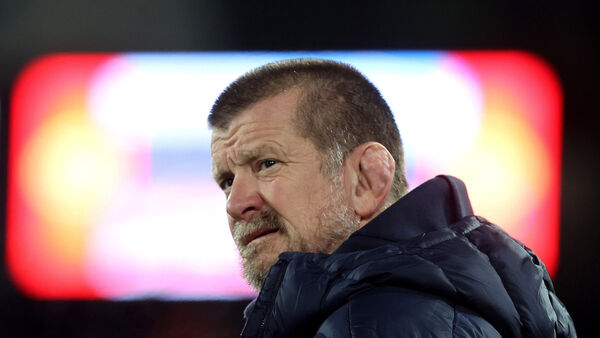Graham Rowntree’s exchange with Marcus Horan on TG4 after Munster’s loss to Leinster on Monday only lasted 80 seconds. There was more said in the two answers he gave than we hear in 99% of pre- and post-match interviews that last twice as long. Interviews before and after matches are a fundamental part of sporting coverage. If they didn’t happen, we would quite rightly be asking for an explanation why.
In most cases, however, they are a formality and we can probably recite the answers before the interviewee opens their mouth. It’s usually dull and predictable. A successful coach will say they are happy with the result but there is work to do, and look ahead to the challenge next week. A man of the match or winning captain will speak about how they’re proud of the lads and play down their own contribution.
The real honesty tends to come in the aftermath of defeat, when emotions are high and frustrated people are on edge. There was honesty in Rowntree’s assessment of the game. Not just in his words but also in his face and general demeanour. “Genuinely struggling for positives at the moment,” he said. “They had a guy in the bin, then we concede two soft tries – can’t sugar coat it more than that. Two soft tries which we never recovered from, if I’m honest with you.”
The unminced words were accompanied by a scowl, instinctive shakes of the head and shrugs of the shoulders. It all combined to paint a clear picture. It was raw. He was hurt. I felt guilty on behalf of the lads that had played. While it wasn’t the kind of interview any Munster supporters wanted to see, it cemented the impression that on a personal level, Rowntree is heavily invested in this project.
Many coaches would have spoken about the silver linings and coming up just short against the standard setters of European rugby; about this being part of a longer journey and how things are moving in the right direction. Not him. He was honest about how he felt. And if he’s being this direct and honest in a post-match interview, he’s probably being as direct and honest with his players in camp, which is exactly the kind of trait you want in a head coach. Honesty from your coach is invaluable in team sport but it’s not as ubiquitous as you might think.
As with many things in life, being a straight talker is nice in theory but a different proposition in reality. A majority of people will bend over backwards to avoid confrontation. They will say and do what they need to in order to keep the peace. In most professions, this probably doesn’t pose a huge problem.
When you first come into the world of professional sport, you assume all the ambiguity is finished and that everything will be black and white from that point on. Straight talking. No guessing. You learn quite quickly that pro coaches are as susceptible to being vague and cryptic as the ones you worked with underage or at club level.
As a coach you are constantly, out of necessity, telling half of your employees they aren’t good enough to represent the organisation in a given week. That doesn’t happen in many lines of work. If you have 45 players available for selection, 22 of them are going to be disappointed and want to know what they can do to rectify things. In such a setting, beating around the bush and avoiding conflict becomes an issue.
During my career, I experienced every point of the selection spectrum. I was the young guy chomping at the bit to get his first opportunity; I was the guy who knew he was going to get picked every week; I was the guy who had fallen out of favour and wondered if he would get another chance to show what he could do. Regardless of where I stood, what I wanted more than anything was to know just that – exactly where I stood.
The last thing you want to hear when you approach a coach for feedback is that everything is rosy and there is nothing for you to improve. Not only is it clearly a lie (if everything was good, you would be playing), it also gives you nothing to work with. You would be surprised by the number of professional coaches who come out with a mealy-mouthed reply when you ask them why you’re not playing.
“You’re so close, you’re doing everything right….you just need to be patient…we’re very happy with you, it’ll come”, and so on, like dangling a carrot just out of arm’s reach while you’re stuck on a treadmill with no way of getting any closer. You can’t take ‘everything is fine’ out on the training pitch and do extra work to get better at it. Most players want honest, detailed feedback on where exactly they need to improve.
They want to hear what the point of separation is between them and the guy who is getting picked. Be it that their defence needs to get sharper, they need to make stronger carries, get bigger, get lighter, get stronger, get fitter; whatever it is, having a clear objective to work towards is what they need to stay motivated and on track.
I say most, not all, because the theoretical commitment to honesty and directness applies on both sides of the fence. Every player will claim they want a coach to be blunt and tell it like it is. That is true in the majority of cases but a certain cohort do not respond well to direct, constructive criticism. They get defensive, take it personally and hold it against the coaches.
Nearly every player is guilty of having a bitch and a moan now and again when things aren’t going their way. It’s part and parcel of competitive sport. Most know when to rein it in and are conscious of not sounding too cynical. A small number either don’t have that awareness or choose to ignore it, and become a source of negativity. If you have three or four guys with that attitude at the same time, that negativity can begin to permeate the playing group, like a drop of poison.
As such, coaches have a bit of a balancing act to perform and this is part of the reason many of them err on the side of caution when it comes to being straight with their players. Like any boss giving feedback to someone on their team, there is a risk the person in question will take it badly. It’s a natural human instinct to want to protect the self-esteem of others but in a sporting context, it’s always better to be as blunt as possible.
While it may cause some short term pain, players ultimately appreciate the honesty and get over it quicker. It’s a much more preferable option to fobbing a player off with four or five different conversations over a period of months when one uncomfortable exchange would get everyone on the same page and make clear where each party stands.
In my experience, Irish players tend to respond to constructive criticism pretty well. They take it on board and go about trying to set it right. In France, egos are more brittle and everyone wears their heart on their sleeve. Players are more likely to throw the toys out of the pram. One coach I know who previously worked at a big Top 14 side told me there was a club legend there who had played there all his life and was part of the furniture.
If he wasn’t named in the team when it was announced on a Thursday, he would often just disappear and head home without telling anyone. It would only be when the non-selected were running plays against the starters and they were a man down that people would realise he was missing. Such a move would probably see you suspended from training for a week in Ireland but in France, the coaches nearly had to beg him to come back in the next day.
Rowntree’s post-match interview was a breath of fresh air but it was just an interview at the end of the day. What it did was give us some insight into how he conducts his business as a Munster boss. We should be encouraged by what we saw and what it says about the culture being built at the club. It’s a time for honesty, not empty words, and it looks like the former is there in abundance.

